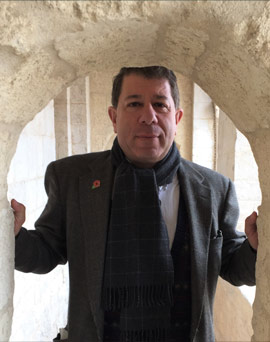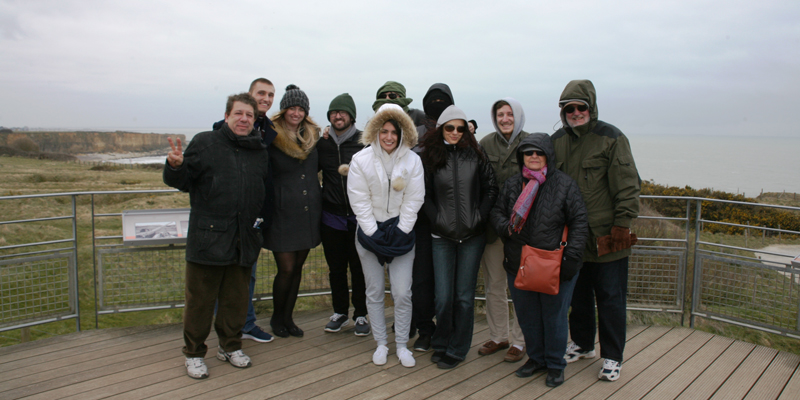Longtime Saint Leo Professor Continues to Adapt for His Students
Meet Dr. Marco Rimanelli, an Italian-born political science professor who has taught at Saint Leo University for parts of nearly three decades.
Meet Dr. Marco Rimanelli, an Italian-born political science professor who has taught at Saint Leo University for parts of nearly three decades.
 For nearly three decades, Dr. Marco Rimanelli has been teaching courses on the political sciences to Saint Leo University undergraduate students. Over this time, he has always been open to evolving as an instructor to effectively serve the changing student population.
For nearly three decades, Dr. Marco Rimanelli has been teaching courses on the political sciences to Saint Leo University undergraduate students. Over this time, he has always been open to evolving as an instructor to effectively serve the changing student population.
Born in Rome, Italy, he is a dual U.S.-Italian citizen and previously lived in New York City, Paris, and Washington D.C. before moving to Tampa, FL. He is trilingual in English, Italian, and French, and the proud father of a 12-year-old son, Gianluca.
Rimanelli is a Full Professor of Political Sciences and International Studies with tenure who teaches in Saint Leo University's BA in political science degree program. He also serves as editor of the Florida Political Chronicle, the scholarly journal of the Florida Political Sciences Association.
Rimanelli never openly spoke of his family history until now because, in his words, "it sounds more like an adventure novel." In a very uncharacteristic way for Italians over the past two centuries, Rimanelli says his family has been a melting pot of individuals of different countries and comprising all classes of society. This includes relatives from Hungary, Great Britain, and different regions of Italy. Despite this variety, they all have had a common thread to work hard, something that has influenced his life in many ways.
"We've had day laborers, artists, law enforcement officers, engineers, lawyers, medical doctors, aristocrats, celebrated writers, and university professors in the family," he says. "Many lost everything due to revolutions and both World Wars I and II and had to reinvent themselves by emigrating abroad to regain financial stability and improve their social status. But they all shared a love for democracy and a drive to survive, succeed, and give back to the community."
His great-grandfather, Ómer Pasha, was the Hungarian medical doctor at the Ottoman Court of the Sultan and the American College. His great-great-grandfather, Áloys, was also a doctor who lost his Hungarian-Transylvanian property and aristocratic title after joining the doomed 1849 Hungarian Revolution of Lajos Kossuth against the ruling tyrannical Austrian Empire. He later escaped to the Ottoman-Turkish Empire and served as a foreign officer in the Turkish Army in the 1850s Crimean War.
His grandmother, Alice Nówotny Pasha, was a Hungarian aristocrat residing in the Ottoman-Turkish Empire where she earned a bachelor's degree in 1908 at the American College of the Orient (for Girls) in Constantinople, a highly unusual achievement for a woman at the time. She also tutored the youngest daughter, Musbah, of Emir Ali Haidar who was the last rival Shereef of Arabia and Custodian of the Muslim Holy Sites of Mecca and Medina in the 1910s before the collapse of the Ottoman Empire.
His grandfather, Ettore Chiurazzi, was one of a few who enlisted as a soldier and retired as a brigadier general in the Italian Carabinieri, including combat service as captain leading the Carabinieri unit that protected the Italian Military Headquarters during World War I.
As for his parents, his mother, Liliana Chiurazzi, was one of a handful of Italian female executives in the 1950s. She worked as a publicity journalist for the Rank Organization promoting British movies in Europe. His father, professor emeritus Giose Rimanelli, came from humble beginnings to carve out his own successful career.
"My father was very poor from the Italian south, a land that lost half its population to constant emigration to the Americas," he explains. "He served as a teenager at the end of World War II and he was forcibly enlisted in the Fascist Legion fighting against the Italian Partisans and was a prisoner of war in a concentration camp. This is where he met the American poet, Ezra Pound, who inspired him to become a writer, journalist, and professor. My father later taught at Yale, UCLA, and SUNY Albany."
Giose Rimanelli went on to publish 50 books of prose and poetry, including a wartime memoir, The Day of the Lion. Additionally, he was the only Italian writer contracted by the Library of Congress to translate the "Gettysburg Address" into Italian for a centennial publication.
The Rimanelli family moved to New York City when Marco was two, but he returned to Italy by age seven where he spent most of his schooling years. In college, he was a triple major and graduated summa cum laude in his joint bachelor's and master's degree program in political sciences from the State University Sapienza—Rome, 1 in Italy. He then earned an international diploma in European affairs from Johns Hopkins University's School of Advanced International Studies (SAIS)-Europe in Bologna, Italy. He went on for a master's in U.S. foreign policy and international security and his Ph.D. in U.S.-international security and European affairs at Johns Hopkins University-SAIS in Washington, D.C. He became the only European student to earn five full scholarships for all three Johns Hopkins degrees.
In addition, he has a diploma in military history/strategy from West Point, a graduate certificate in laws of war from the Sherman Kent School of Intelligence Analysis, and a graduate certificate in criminal justice management and terrorism from Saint Leo University.
Early in his career, he worked for the U.S. Department of State in arms control.
"I dealt with the end of the Cold War and the collapse of the Soviet Union when it became Russia," he explains. "I worked to help cut down most of the theater nuclear missiles through the Intermediate-Nuclear Forces (INF) Treaty, the Short-Range Nuclear Forces (SNF) Accord, and the Nunn-Lugar Act on Safe & Secure Disarmament (SSD)."
Throughout his teaching career, he has always sought to blend academics with governmental experience, using a few sabbaticals to pursue practical experience in the field. He worked for the CIA's Directorate of Analysis for two years as a scholar-in-residence on NATO security; served a year as U.S. fellow on international security at the French War College in Paris; and was a Fulbright chair at the post-graduate European College of Europe-Bruges in Belgium where he taught master's-level courses on international affairs.
Rimanelli is grateful for Saint Leo allowing him to take some time away from the classroom but to then return with even more global knowledge to share with his students.
"I've been very fortunate that the university has given me time to teach, write my own books, and explore professional venues through a few sabbaticals."
His teaching career began at George Mason University in Virginia. He has also taught at American University in Paris and John Cabot University in Rome. In January of 1993, he flocked south to sunny Florida to accept a full-time, tenure-track teaching position role at Saint Leo University.
"They were kind of desperate to fill the position at the time because of a previous professor who had left for another university," he recalls. "I thought it would be a great opportunity to work on a teaching campus with smaller classes. Looking back, it's been a wonderful experience. We have always really supported each other as an organic, interdisciplinary faculty."
He believes Saint Leo has allowed him to grow as a professor in more ways than one.
"In the past, I've taught many different classes originally taught by others because the circumstances warranted it. This has helped me expand my repertoire and expertise over time."
He was given the opportunity to create several online courses for the university when it became one of the first in the nation to offer virtual learning in the late 1990s. He prides himself on having adapted his teaching style to students who have evolved with time to different technological mediums to meet their learning needs.
"I was using audio and visual content early on in my teaching career," he says. "I then incorporated online research and now use lots of video clips and other visuals since students today are far more interested in consuming multimedia. You have to make history and international politics relatable to students, even if that means showing parts of a movie to explain the context of historical events."
He has taught a wide range of courses for Saint Leo, including Democracy in Troubled Times, Comparative Politics, Developing Nations, International Law and Organizations, Genocide and Laws of War, and Military Strategy and Wars: Antiquity to NATO.
Rimanelli says the Socratic Method infused with technology is a cornerstone of his courses.
"I interact and pose questions to my students using logic and reasoning after explaining the facts in details with PowerPoints and audio-visuals," he explains. "These days, a lot of students think they can just Google the answers to everything. The fact is that while you can find lots of information online, you still have to learn the ability to analyze and extrapolate it."
 Unmatched Support for his Students
Unmatched Support for his StudentsHe says he has found it to be quite rewarding to serve as an educator and advisor, always doing whatever he can to ensure all of his students are put in the best possible position to learn at Saint Leo University and succeed in life.
"As professors, it is our duty to help everybody, no matter whether they are cut out for college or not. This is Responsible Stewardship, one of our core values. I want all of my students to have the opportunity to achieve the same level of academic success and ensure they receive the best education they can possibly get in order to help them evolve as students and professionals."
Outside of the classroom, he always takes the time to write letters of recommendation for his students, especially since he wasn't always fortunate enough to get this additional support from his own professors.
Over the years, he has organized numerous study abroad opportunities to Europe, demonstrating another form of educational support through immersion in regional history, arts, and politics. He has taken students to London, Paris, ‘D-Day' Normandy beaches, Brussels, Prague, Vienna, Venice, Rome, and Athens.
"Many of these sites have historical significance in terms of previous wars, treaties, and other major events," he explains. "These trips have truly opened students' minds in so many ways."
Rimanelli has published eight books during the course of his career. These include The 1891 New Orleans Lynching and U.S.-Italian Relations (1992); Italy Between Europe and the Mediterranean (1997); Strategic Challenges to U.S. Foreign Policy in the Post-Cold War (1998); Comparative Democratization and Peaceful Change in Single Party Dominant Countries (1999); and Historical Dictionary of NATO and International Security Organizations (2009, with a second edition in late 2021).
His latest book—a collaboration among several Saint Leo faculty members—is an interdisciplinary analysis called the Centennial of World War I and Peace, 1914-2019.
He has fond memories of former longtime Saint Leo University President Dr. Arthur Kirk and how he navigated the university through a very difficult period in the 1990s through innovation and technology. He believes current University President Dr. Jeffrey Senese has a similar drive and plenty of positive plans in store to continue Saint Leo's growth.
"I look at Dr. Senese as a newer version of Dr. Kirk," he says. "Dr. Senese has already done a herculean job for the university during these highly challenging times of budgetary, demographic, and health crises within higher education. He has focused on his personal tenacity and Saint Leo's vision to steer our academic ship toward a bright future while many other schools in less fortunate situations have struggled."